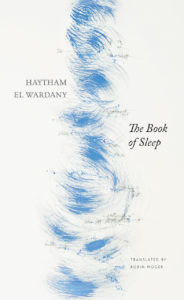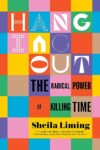
[Seagull Books; 2020]
Tr. from the Arabic by Robin Moger
When we think of life, we tend to think of waking life. As if, for every two hours spent awake, we didn’t spend another sleeping. Out of habit, we omit that third hour from our experience. The counterweight to consciousness, sleep resists the waking mind. As a culture that values the image, we know a thing or two about dreams. In resembling, however superficially, what we see with waking eyes, dreams are recognizable to ever-narcissistic consciousness. But dreams are only one stage of sleep, and dreamless sleep eludes representation. A person can look up all the facts about sleep, surround themselves with its commodities — mattress, sheets, alarm clock, bedside table, white noise machine, sleep aids of all kinds — and never grasp it experientially. How can one fully grasp an absence of sensation? In the large-scale long-term, the dominance of instrumentalized consciousness proves ever more dubious. Lost in the labyrinth of our own encrusted contradictions, we slide towards the brink of environmental and societal collapse. Precisely because sleep evades waking consciousness, it is critical, now more than ever, that we plunge into its mysteries. In a word, we need a nap. For our guide, Haytham El Wardany’s The Book of Sleep.
If sleep, by its very nature, is antithetical to rational discourse, the tried and tested methods will fail to apprehend it. For El Wardany, sleep’s role as disruptor of narrative excludes it from truth and fiction, but not from poetry. “Like the sleeper,” he writes, “poetry is a wanderer between worlds; it belongs to none. One world passes into the other, and in the course of interpenetration, the poetic is given off like vapor.” With this in mind, El Wardany concocts a mix of genres, taking the critical essay for his base ingredient and poetry for his reagent. Here we must keep in mind the etymology of “essay,” to attempt. El Wardany does not pronounce the definitive word on his subject, he claims only to approach it. His arguments simmer in a melange of psychology, sociology, philosophy, politics, literary criticism, dream diary, and poetic speculation. This interpenetration of genres and disciplines advances in its own language, improvised section by section to meet the demands of rhythm, compression, and metaphor — the sense of which Moger’s translation deserves praise for preserving. Rarely longer than a page, each essay is a brief foray. One can read them simultaneously as prose poems.
Both poetic knowledge and dream-logic are rooted in metaphor. By asserting the identity of nonidentical objects, metaphor draws them into a living relation that melts the fixed definitions of dead thought. Though sympathetic to revolution, El Wardany is no idealogue. Alive with metaphor, his insights are free of doctrinaire jargon, not regurgitated but uncovered along the way. For him, life itself is an uprising, a revolution on the cosmic stage. He writes:
Gravity is the force which guards the universe’s order and it was in gravity’s fields that life first rose up in a futile attempt at defiance. Each morning the battle of wits begins, a battle in which no effort is spared: to stand tall; to cast off gravity . . . Some things manage to slip free and others fail; people trip and fall then get back up; And so on, all day long, until night comes. A truce is brokered and for a while the struggle ceases . . .
Politically charged words like “order,” “defiance,” “battle,” and “struggle” serve the metaphor. Life is a struggle against nothing less than the force of gravity, which power has always tapped in its organization of hierarchy (hence the word oppress). Just because gravity and power can seem impossible to transcend, doesn’t recommend death. Sleep, a temporary cease in struggle, is death’s doppelgänger, but unlike death, sleep does not mean defeat, because:
No sooner is the struggle resolved than the unexpected happens: the moment of surrender, of submission, is the moment of liberation. Surrendering to gravity, sprawled flat on the ground, the sleeper is afloat and weightless . . . and for a brief spell, feeble sleep is a match for that great force on which the universe is founded.
The weightlessness of sleep is a rehearsal. At the nadir of our power we come closest to freedom. Present in its absence, sleep is the Stateless state, utopia. In the temporary abdication of power, at least over one’s own body, the body heals and practice settles into muscle memory. This abdication is critical, paradoxically, for the long-term gains of any movement which aims to wrest power from the State. Occupation is, For El Wardany, “the most extreme expression of the protest movement and its moment of greatest peril, because it takes the initiative, fashioning a new reality by taking over the public space,” but it succeeds only in an act of “antithetical vulnerability,” when occupiers succumb to sleep, “an act that critiques the very principle of action . . . The sleepers in an open ended occupation are no longer individuals in a battle, but lying together, side by side, have become brokers of a new reality, their dreams the language of this new reality . . .” Something mysterious happens when the new reality bridges the dark gap of sleep and remains intact. The new day and the new reality fuse. They take on form, stability. Power in the abstract settles into the muscles as a rhythm. The larger the occupation, perhaps, the greater in number the bodies waking to a new reality, the more power is potentially disbursed among those who had none a day before.
As if each section were separated by a night of sleep, this formal insight plays out in El Wardany’s construction of the book itself. Without ever abandoning prose, he shifts in and out of modes and registers. Compared to the sections I have previously quoted from, “The Heart of Night” exhibits a much more poetic form:
Hearts turn to their devotions. Glad tidings come to pass . . . Plots are hatched. Decisions taken. Dreams weaved. Drink spins heads. The devil of poetry alights. The idea glints. Death sentences are executed. Thieves take homes. Killers sink daggers in their victims’ hearts. Calm settles. The wound binds. The sick recover. Bodies tangle. Desire branches out and begins to bud . . . Ghosts appear. Wild beasts rampage in the streets. Death stands in wait . . . Curses are loosed. Charms are cast . . . Devils goad. Angels stoop. Quiet comes. Starts shine. Prayers are answered. The city returns to itself.
Here we have a list of declarative sentences, built from the basic unit of noun does verb. Once established, form allows for a progression semi-autonomous from authorial intent. Because the list is unnumbered and lacking narrative markers like “then,” the order is indeterminate, such that these actions take place all at once. Importantly, hearts, dreams, death, quiet, and the city are accorded the same level of agency as thieves, killers, smugglers, devils. The darkness hides a frenzy of activity. The heart of the night is transformed from a stock phrase, a dead metaphor, by the “turn to their devotions” of hearts nested in the text. We are invited to imagine night as an organism, its heart pulsing with life-force, as enacted by the rhythm of these short, simple sentences. With “the devil of poetry alights,” El Wardany allies his poetry with the unseen, the antagonist, irrational desire, the body. When a poet consciously takes up form, the poem can begin to play by its own rules. Form sparks an interplay between conscious and unconscious operations, analogous to the oscillation between waking and sleeping.
At the heart of The Book of Sleep we find a sequence of three sections, each entitled “Who Is the Sleeper?” All three begin with the same three responses to this question, framed as questions themselves: “A limb severed from the whole? A single self? A small group at rest?” At first I wondered if the section had been reprinted my mistake. This confusion turned out to be a productive evocation of the recurring dream. Each section, it turns out, offers a different set of answers, none definitive. The first suggests that the difference between the waking and the sleeper “is that the former tends to preserve his social body and reaffirm its boundaries, while the latter moves to blur the body, to muddy its purity by opening it to others.” The sleeper’s dreams combine content indiscriminately, such that each sleeper is “a city broken free of its map, its districts and streets mixed together, fit not for habitation but perpetual displacement.” This is not the first instance in which El Wardany used the city to evoke the body-politic. An organism can be seen as a society, of cells, organs, muscles, nerves, drives, etc. In its modern form, waking consciousness functions by treating the body as if it were a unitary self, an individual person governed by reason. This delusion is helpfully propped up by capitalist ideology. The ownership of private property by individuals gets tricky when the individual is not a given, when consciousness, the body and all its parts, instincts, drives, fears and desires, are experienced, in sleep, as an alliance of mutual convenience. In the act of sleeping, “the city returns to itself,” an ungoverned physical manifestation, a thing among things. This radical leveling incites the unconscious into dream, the “inarticulate babblings” of which, “at once personal, social, and political,” poetry has the dangerous capacity to translate for a waking audience.
The second section all but refutes the fist, arguing that the sleeper’s identity is ultimately “the impoverished question” of a waking state. “What sleep proposes is that there is no individual as distinct from a group, and no group made up of individuals. There are only groups.” Sleep melts the binary logic of waking consciousness, which draws boundaries around everything including itself. Survival demands it. But these boundaries, shifting with history prove arbitrary. I might add that power not only deploys the same this-or-that logic, but identifies one of every two terms with itself, loading it with values of its own. Even the distinctions between waking and sleeping are expedients. Anything examined in isolation and not as a group of interactions interacting with wider groups, provides an “impoverished understanding.” But if there are only groups, what groups does sleep return us to?
In third and final “Who Is The Sleeper,” El Wardany speculates that the sleeper, awash in absence, peoples it with those who are absent, so that “all he sees of the community to which he belongs is its absent part, the cracks and breaks which spread and widen day after day . . . The group to which the sleeper belongs is a lost group, marching towards the open wound.” As distinct from memory, which surveys the past while keeping it in the past, sleep makes the past present “as though it happened differently,” as El Wardany points out elsewhere. Former lovers haunt us and the dead return as ghosts. Sleep revisits them, without healing over “the wound” of their absence. Sleep is a sieve of inscrutable mold. Some clumps of the past slip through to be swallowed by absence, possibly forever. Others collect in deep recesses from which they may return only decades later, warped beyond recognition. The process of forgetting has two faces. As a ruthless negation of the past, it also clears the ground for renewal. Forgetting may serve as an antidote to ideology, and at the same time, a reinforcer of it, erasing that which does not fit into the dead schema.
It should come as no surprise, El Wardany tells us, that capitalism undermines sleep by establishing rigid distinctions between work, leisure, and rest. Treated as a drastic “waste of time” that could be spent productively, sleep is begrudgingly tolerated and reduced to a function: to refresh workers so that they can come back tomorrow and keep working. Sleep is forgotten the moment the alarm breaks its spell, catapulting us into waking productivity. What we might learn from sleep we repress to meet the demands of waking, wage-earning life. El Wardany identifies a means of combating this tendency. “Waking is the daily threshold,” he writes, “which separates world and world, and anyone who crosses it can never be the same as they were before. But waking is only completed by the reclamation of the dream.” El Wardany warns against treating dreams as lessons or parables, narrative forms antithetical to the “constantly evasive transformative energy” that is their essence.
Though several sections of the book resemble diary entries, I don’t think El Wardany prescribes any particular method here. Poetry, of course, is one possibility, and El Wardany’s call echoes that of the Surrealists, who’s work he addresses in a section “Little Heart.” El Wardany locates the movement’s power in its rupture of the boundary between “world and world.” Opposed to the bourgeoisie, who “mythologize dream and reduce reality to moral platitudes,” Surrealism “aims to blow reality apart and fertilize it with unconscious experience.” For Wardany this is the “little heart which beats beneath the commercialized wreckage of Surrealism.” Modern power mobilizes language, let’s say, at two levels. At one level: a language condensed to information, a daily bombardment of news and facts about reality, posing as objective. At another: a language of ideology which, as El Wardany puts it, “inhabits you and speaks in your voice.” These languages collapse in a pincer movement on the subject. If a subject’s voice, derived solely from waking experience, falls so easily into ideological traps, should poetic language abandon the search for some authentic, unitary voice? “What is language, after all, if not the capacity to extract what has happened from itself,” writes El Wardany. Language, he suggests, can establish itself as autonomous — not a mere running commentary, but a new reality in itself. “The sleeper’s incomprehensible mutterings,” El Wardany tells us, “deliver the sleeper from power’s dominion and confound its language. The sleeper speaks, but says nothing . . . only liberates a stream of language.” In this liberated form, language “does not issue from a mouth behind which stands a self. Its pieces take shape like clouds in the sky.” Power can never, in the long run, subordinate its cloudlike antithesis, which can’t be definitively interpreted or pigeonholed, to the reproduction of power which is power’s only end.
Is it futile in our time for poetry to take up language in a revolutionary way, to perform the transfer of “constantly evasive transformative energy” into waking life? The Book of Sleep leaves us with the triad of sleep, revolution, and poetry, each inseparable from the other. When we separate life from its utility, we come closer to free play, to liberation as an ever-ongoing struggle. El Wardany invites us to consider poetry in its broadest possible sense, as an enervation armed with the logic of metaphor rather than cause-and-effect, which manifests not only in lines, in the streets. Lived universally, sleep and dream have the potential to open us to the collective unconscious and dissolve the limitations of the self under capitalism. When we wake up tomorrow, let’s build whatever we can dream.
William Repass lives in Pittsburgh, PA, where he works as a projectionist at an art house cinema. His poetry has appeared in Bennington Review, Denver Quarterly, Hobart, Small Po[r]tions, and elsewhere.
This post may contain affiliate links.







